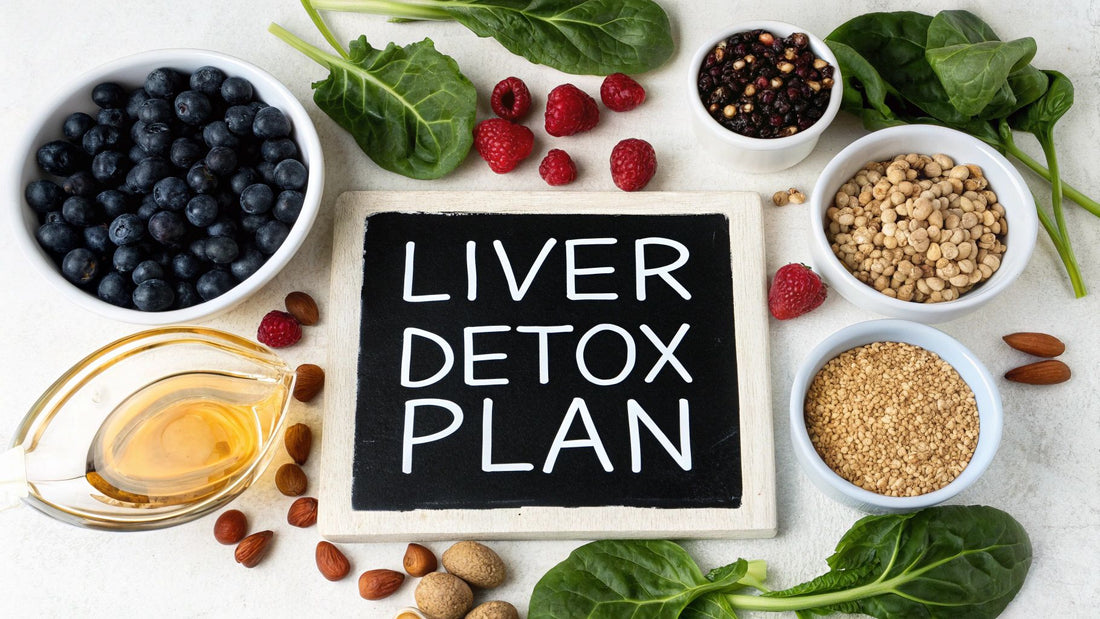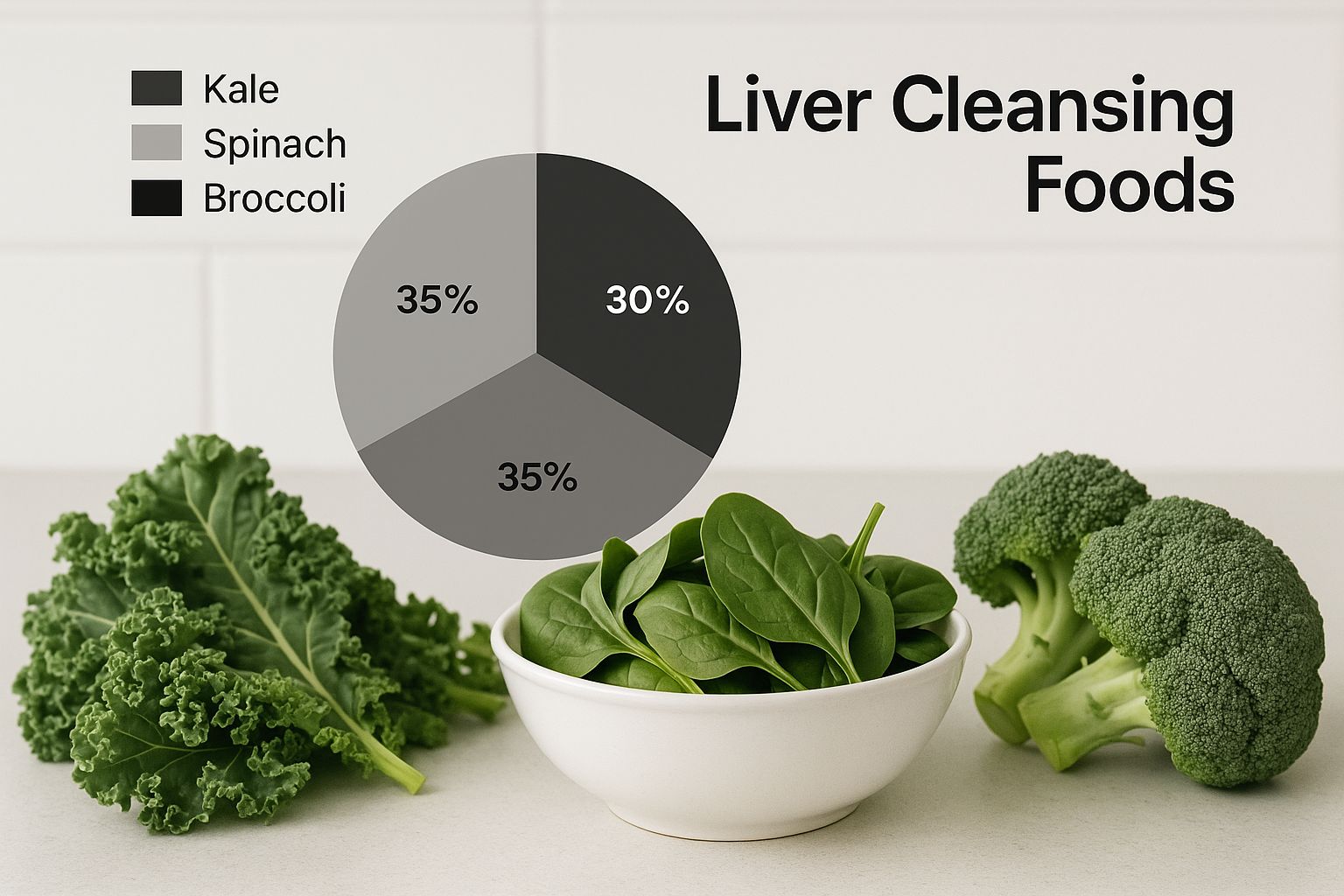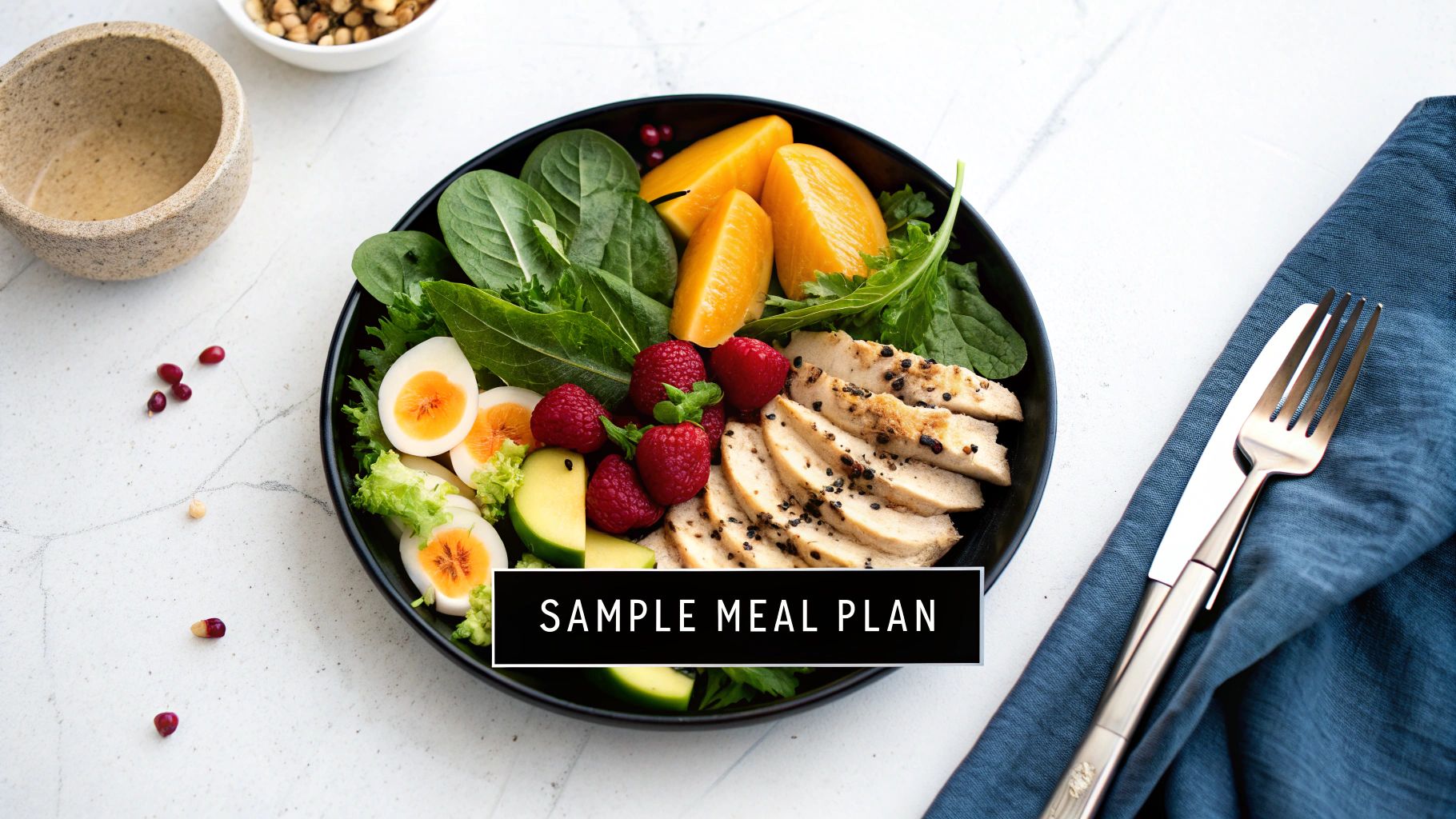
A Liver Detox Diet Plan That Actually Works
Share
Let's clear the air on what a "liver detox" really means. It's a term that gets thrown around a lot, often conjuring images of extreme juice fasts or expensive supplement kits that promise a quick fix. But a true liver support diet has nothing to do with those harsh, restrictive cleanses.
The focus is actually on nourishing your body with nutrient-rich, whole foods and cutting out the things that make your liver work overtime, like alcohol and excessive sugar. The goal isn't to force a "detox" but to create the perfect environment for your liver to do its job brilliantly.
What a Liver Support Diet Really Means
Before we jump into meal plans, we need to get on the same page. Your liver is an absolute powerhouse. We're talking about an organ that performs over 500 essential functions, and it's already an expert at detoxifying your body 24/7.
It doesn't "store" toxins like some marketing slogans want you to believe. Instead, it processes harmful compounds and gets them ready for removal. A genuine liver detox diet plan is all about reducing its workload and giving it the specific nutrients it needs to run efficiently. This is a fundamental shift from a temporary, often punishing restriction to a sustainable, food-first philosophy.
The Problem with Commercial Cleanses
Let's be blunt: many commercial detox programs are not just scientifically shaky—they can be downright risky. The market is flooded with products that lack any real evidence and aren't approved by regulatory bodies.
When you drastically restrict calories, you're starving your body of the very nutrients it needs to function. On top of that, unregulated herbal supplements can sometimes contain ingredients that are actually harmful to your liver—the very organ you're trying to help.
"A true liver-supportive diet is less about a dramatic, short-term 'detox' and more about consistently making choices that lighten your liver's load. It’s a marathon, not a sprint."
Research consistently backs up this more cautious, food-focused approach. A comprehensive 2015 review of commercial detox diets, for example, found that the studies supporting them were often small, flawed, and unreliable. The experts' takeaway? Most of these plans are unnecessary and can even pose health risks. You can read the full research on detox diets for a deeper dive.
Shifting to Sustainable Support
So, if those cleanses aren't the answer, what is? A sustainable liver support diet is built on a foundation of whole, nutrient-dense foods that actively help your liver thrive.
Here’s what that looks like in practice:
- Focus on Whole Foods: Think a vibrant variety of fruits, vegetables (especially leafy greens!), lean proteins, and whole grains. These foods are packed with the antioxidants and fiber that protect liver cells and support healthy digestion.
- Limit Liver Stressors: This is perhaps the most powerful step you can take. It means reducing or eliminating the things that force your liver into overdrive. We're talking about alcohol, highly processed foods, fried items, and added sugars—especially high-fructose corn syrup.
- Embrace Healthy Fats: Not all fats are bad! In fact, some are essential. Incorporating sources of omega-3 fatty acids, like those found in wild-caught salmon and walnuts, can help combat inflammation, which is a major factor in liver health.
Ultimately, this is about nourishing your body for the long haul, not just a temporary fix. It’s about building habits that let your liver do its critical job effectively, day in and day out.
Building Your Liver-Friendly Eating Plan
When people hear "liver diet," they often imagine a miserable world of bland, restrictive foods. But that's not what this is about. Shifting to a liver-friendly way of eating is less about rigid rules and more about making consistently smart choices with whole, nutrient-packed foods. The idea is to give your liver a helping hand, not to force it into a corner with some unsustainable, short-term fix.
A great place to start is by simply being mindful of how much you're eating. It might sound obvious, but the science backs it up. A huge study looking at over 100,000 people found that higher calorie consumption was a major difference between folks with non-alcoholic fatty liver disease (NAFLD) and those with healthy livers. Even a modest reduction of about 500 kcal/day can make a real difference in body weight, liver enzymes, and overall fat in the liver.
If you're the kind of person who likes to track things to stay on course, checking out some of the top food tracking apps can be a really practical way to keep an eye on your daily targets without getting obsessive.
The Macronutrient Blueprint
A balanced liver detox diet plan isn't about cutting out entire food groups. It’s all about choosing better sources of proteins, carbs, and fats.
-
High-Quality Proteins: Your liver needs protein for repair, but the source matters. Think clean, lean options like wild-caught salmon, organic chicken breast, lentils, and beans. These give you the essential amino acids without the heavy load of saturated fat you'd find in processed meats.
-
Complex Carbohydrates: It's time to swap out the white, refined stuff for complex carbs loaded with fiber. Fiber is a game-changer for your gut, and a happy gut often means a happy liver. Quinoa, brown rice, oatmeal, and whole-grain bread are fantastic choices. Even better, when you get these from Naked Pantry, they arrive plastic-free, keeping your food as clean as your diet.
-
Healthy Fats: Don't fear fat! Healthy fats, especially those rich in omega-3s, are powerful anti-inflammatories. Things like avocados, walnuts, chia seeds, and good-quality olive oil can help calm the inflammation that often comes with liver stress.
This image gives you a great visual of the kinds of foods you should be reaching for.

As you can see, it really highlights how foods like broccoli and spinach aren't just "healthy"—they contain specific antioxidants and compounds your liver actively uses during its natural detoxification process.
Foods to Prioritize vs. Foods to Limit for Liver Health
To simplify things, just think in terms of "eat more of this" and "eat less of that." This isn't about being perfect; it's about making better choices most of the time. Think of your grocery cart as your first line of defense. What you put in it is the most powerful first step you can take.
Here’s a clear guide to making smart food choices, showing what to add to your grocery list and what to leave on the shelf to support your liver.
| Food Category | Prioritize These (Liver-Supporting) | Limit These (Liver-Stressing) |
|---|---|---|
| Vegetables | Cruciferous veggies (broccoli, cauliflower, Brussels sprouts), leafy greens (spinach, kale), beets, carrots, garlic. | Fried vegetables, vegetables in creamy or sugary sauces. |
| Fruits | Berries, citrus fruits (lemons, grapefruit), apples, avocados. | Fruit juices, canned fruits in heavy syrup, dried fruits with added sugar. |
| Proteins | Wild-caught fish (salmon, sardines), organic chicken/turkey, legumes (lentils, chickpeas), tofu. | Processed meats (bacon, sausage, deli meat), high-fat red meat, fried meats. |
| Carbohydrates | Quinoa, brown rice, oats, sweet potatoes, whole-grain bread. | White bread, white pasta, pastries, sugary cereals, packaged cookies and cakes. |
| Fats | Extra virgin olive oil, nuts (walnuts, almonds), seeds (chia, flax, hemp). | Margarine, shortening, processed vegetable oils (soy, corn), trans fats found in many processed snacks. |
| Beverages | Water, green tea, herbal teas, black coffee (in moderation). | Soda, sweetened iced teas, energy drinks, excessive alcohol. |
By focusing on filling your plate with foods from the "Prioritize" column, you’ll naturally crowd out the less helpful options, creating a sustainable eating pattern that truly nourishes your liver for the long haul.
A Sample 7-Day Liver-Friendly Meal Plan

It’s one thing to talk about which foods are good for your liver, but seeing a full week laid out makes it all click. This sample 7-day plan is designed to show you just how delicious and satisfying supporting your liver can be.
Think of this as a flexible template, not a strict prescription. Feel free to mix and match meals, swap out proteins, and adjust portion sizes based on your own appetite and preferences. The real goal here is to prove that you can nourish your liver without feeling deprived.
Kicking Off the Week
Day 1
- Breakfast: A warm bowl of oatmeal is a fantastic start. Cook it with water or low-fat milk and top it with a handful of fresh berries for a dose of antioxidants and a sprinkle of Naked Pantry Chia Seeds for fibre and healthy fats.
- Lunch: A big, vibrant salad. Use spinach as your base and top it with grilled chicken breast, cucumber, and tomatoes. For the dressing, whisk together some extra virgin olive oil and fresh lemon juice.
- Dinner: Keep it simple with a sheet pan meal. Bake a salmon fillet alongside some asparagus spears and sweet potato wedges. A little garlic powder, onion powder, and black pepper is all you need.
- Snack: A cup of plain Greek yogurt with a few walnut halves mixed in.
Day 2
- Breakfast: A two-egg omelet loaded with chopped bell peppers and spinach. Serve it with a single slice of whole-grain toast.
- Lunch: Nothing beats a hearty lentil soup, especially one made with a low-sodium vegetable broth, carrots, and celery. A few whole-grain crackers on the side are perfect for dipping.
- Dinner: A colourful stir-fry using lean ground turkey, broccoli florets, snap peas, and shredded carrots. Use low-sodium soy sauce or tamari for that savoury flavour and serve it all over a bed of fluffy quinoa.
- Snack: An apple with two tablespoons of natural almond butter.
Quick tip: Don't forget to hydrate! Water is your best friend throughout this process. To mix things up, herbal teas like dandelion or green tea are excellent choices that also support your liver.
Mid-Week Motivation
Day 3
- Breakfast: A quick morning smoothie. Blend unsweetened almond milk, a scoop of plain Greek yogurt, a cup of frozen mixed berries, and a tablespoon of ground flaxseed.
- Lunch: Leftovers are a lifesaver. Enjoy the ground turkey and quinoa stir-fry from last night to save time and stay on track.
- Dinner: Simple baked cod seasoned with fresh lemon and dill. Serve it with a side of steamed green beans and some brown rice.
Day 4
- Breakfast: A cup of low-fat cottage cheese is a great source of protein. Top it with fresh pineapple chunks and a sprinkle of sunflower seeds for a boost of Vitamin E.
- Lunch: A whole-grain wrap filled with hummus, sliced avocado, shredded carrots, and a handful of mixed greens. It’s fast, easy, and incredibly nutritious.
- Dinner: A flavour-packed chickpea and vegetable curry. Use powerful anti-inflammatory spices like turmeric, ginger, and garlic, and serve with a small portion of brown rice.
Finishing the Week Strong
Day 5
- Breakfast: Prep this the night before! Overnight oats made with rolled oats, chia seeds, and low-fat milk. In the morning, just top with sliced banana and a dash of cinnamon.
- Lunch: A substantial salad featuring canned tuna (packed in water), chopped celery, and red onion. A light lemon-tahini dressing ties it all together beautifully.
- Dinner: Fire up the grill for some shrimp skewers with bell peppers and onions. A side of quinoa tabbouleh makes this a complete, refreshing meal.
Day 6
- Breakfast: A fantastic plant-based option. Try scrambled tofu with turmeric and black pepper, served alongside half an avocado and a slice of whole-grain toast.
- Lunch: Enjoy the leftover shrimp skewers and quinoa tabbouleh from dinner. Easy and delicious.
- Dinner: A healthier take on a classic: turkey meatloaf. Use lean ground turkey and whole-wheat breadcrumbs, and serve it with a generous portion of roasted Brussels sprouts.
Day 7
- Breakfast: A simple yogurt parfait. Layer plain Greek yogurt with berries and a small handful of mixed nuts for texture and healthy fats.
- Lunch: Time to clean out the fridge! Make a simple vegetable soup using any leftover veggies and some low-sodium broth.
- Dinner: A satisfying end to the week. A perfectly grilled chicken breast with a big side of roasted broccoli and cauliflower.
As you can see, this liver support diet plan is diverse, colourful, and anything but boring. It's all about creating a sustainable way of eating that helps your body do what it does best.
Lifestyle Habits for Optimal Liver Function

While the right foods are the foundation of any good liver detox diet plan, your daily habits are what truly cement the results. Think of your diet as the fuel, but your lifestyle is the engine that puts it all to work. Without these supportive habits, even the most pristine eating plan will struggle to deliver its full potential.
Achieving real, lasting liver health is about looking at the bigger picture. Small, consistent tweaks to your daily routine can dramatically boost the effects of your dietary changes, helping you feel better faster and making your new habits stick. Let's dig into the lifestyle pillars that really protect and support your liver.
Move Your Body to Help Your Liver
Getting regular physical activity is one of the most powerful things you can do for your liver, especially when it comes to reducing liver fat. And no, you don't have to start training for a marathon tomorrow. It’s all about consistency, not just intensity.
Making time for moderate exercise like a brisk walk, a bike ride, or a swim for at least 30 minutes a day on most days can make a huge impact. Exercise helps your body use insulin more effectively and burns triglycerides for fuel, which directly tackles the fat stored in your liver. For a truly immersive experience that ties it all together, you could even explore something like a total detox spa day.
The science here is solid. One groundbreaking study revealed that combining a calorie-controlled diet with high-intensity interval training resulted in significant improvements in liver inflammation, fat levels, and even scarring for those with advanced fatty liver disease. It proves that diet and exercise are a powerhouse combination.
Hydration, Sleep, and Stress Management
Beyond movement, a few other daily practices are absolutely non-negotiable for a happy liver. These simple habits create the right internal environment for your liver to do its job without being overworked.
- Stay Hydrated: Water is critical for helping your kidneys and liver flush out toxins and waste. Make it a goal to drink at least eight glasses of water throughout the day to keep your system running smoothly.
- Get Quality Sleep: We often underestimate the power of sleep. Poor sleep is directly linked to metabolic problems and can make insulin resistance worse, putting extra strain on your liver. Aim for 7-9 hours of solid, uninterrupted sleep each night.
- Keep Stress in Check: Chronic stress floods your body with cortisol, a hormone that can actually encourage fat storage in the liver. Finding a healthy outlet is key, whether it's meditation, deep breathing exercises, or a gentle yoga session.
By weaving these habits into your life, you're doing more than just following a diet. You're building a complete wellness system that supports your liver from all sides, setting you up for long-term health and vitality.
Common Mistakes to Avoid on Your Health Journey
Starting a new health plan is exciting, but I've seen a few common missteps derail even the most motivated people before they find their rhythm. To make your liver detox diet plan a true success, it helps to know which pitfalls to sidestep right from the beginning. This isn't about a quick fix; it's about building a sustainable approach that supports you for the long haul.
One of the biggest traps? Going way too restrictive, way too fast. It's so tempting to go all-in and cut out everything you think is "bad" all at once. While that initial enthusiasm is fantastic, this all-or-nothing mindset often leads straight to burnout and intense cravings. Then, if you have one off-plan meal, you feel like a total failure. The real goal here isn't perfection—it's consistency.
Another pitfall I see all the time is putting too much faith in sketchy supplements. The market is absolutely flooded with products promising a quick liver "cleanse." The truth is, your body doesn't need some magic pill; it needs real, nutrient-dense food. Relying on supplements instead of a balanced diet is a poor strategy. Worse, some contain unregulated ingredients that can actually put more stress on your liver.
Chasing Quick Fixes Over Lasting Habits
Perhaps the most common error is thinking of this as a short-term "detox" instead of a long-term lifestyle shift. So many people follow a super strict plan for a week or two, feel good, and then slide right back into their old habits, undoing all their progress. This yo-yo cycle is incredibly stressful for both your body and your mind.
The goal isn't a temporary fix; it's about building lasting, healthy habits that support your liver day in and day out. True progress comes from the small, consistent choices you make over months, not from a week of extreme restriction.
To really nail this and avoid those common mistakes, focus on making gradual changes you can actually stick with.
- Introduce one new habit at a time. Seriously, just one. Maybe this week, you focus on drinking more water. That's it. Next week, you can tackle adding a serving of leafy greens to dinner.
- Don't eliminate—substitute. Instead of vowing to never snack again, just swap your usual processed chips for an apple with almond butter or a handful of walnuts. It’s a simple change that makes a huge difference.
- Listen to your body. A good health plan should never make you feel miserable. If you're constantly exhausted or ravenously hungry, that’s a clear sign your approach is too aggressive. It’s okay to adjust and find what feels right for you.
By steering clear of these pitfalls, you can build a confident, sustainable approach to health that truly nourishes your body and supports your liver for years to come.
Answering Your Questions About Liver-Friendly Eating
Whenever you start a new way of eating, questions are bound to come up. Getting clear on the details of a liver detox diet plan can give you the confidence to stick with it and see real results. Let's tackle some of the most common ones I hear.
How Long Should I Follow a Liver Support Diet Plan?
This is a great question, and the best way to think about it is not as a short-term "detox," but as a long-term upgrade to how you eat. The core ideas here—focusing on whole foods, eating more plants, and ditching processed junk—are fantastic for your entire body, not just your liver.
You'll likely start feeling better and more energetic within a couple of weeks. However, when we look at the actual clinical markers, studies show it can take several months of consistent eating to see significant improvements in liver enzymes or a reduction in liver fat. The goal isn't a quick fix; it's about building habits that support you for life.
Can I Still Drink Coffee on a Liver-Friendly Diet?
Good news for all the coffee fans out there: yes, you absolutely can! In fact, a good amount of research suggests that coffee can actually be protective for your liver. Studies have linked regular coffee consumption to a lower risk of developing conditions like fibrosis and even cirrhosis.
The catch is how you drink it. If you’re loading it up with sugar and heavy cream, you’re adding a burden of fat and calories that works against your goals. Stick to black coffee or maybe a small splash of low-fat milk to get the benefits without the downside.
The most powerful "detox" isn't found in a bottle. It's simply removing the things that stress your liver (like alcohol and processed sugars) and consistently adding the nutrient-rich whole foods it loves.
Are Special Liver Detox Supplements Necessary?
Honestly, for most people, the answer is no. A diet packed with nutrient-dense foods gives your liver everything it needs to do its job perfectly well. Supplements like milk thistle get a lot of hype, but the scientific evidence for their effectiveness is pretty mixed.
It's so important to remember that no pill can ever make up for a poor diet. Worse yet, some herbal supplements aren't well-regulated and can be contaminated or contain ingredients that are actually hepatotoxic—meaning they can damage your liver. My advice is always the same: talk to your doctor before taking anything new. They can help you figure out if it's safe and truly necessary for you.
A truly clean diet starts with clean ingredients. At Naked Pantry, we deliver high-quality, organic pantry staples right to your door, completely free of plastic packaging. Support your health and the planet by shopping with us today.
